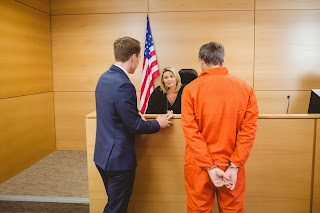It’s almost impossible to predict how a criminal court trial will end. Although crimes are easily categorized, not everyone charged with the same crime will have the same results. Every case is unique and there are a lot of factors that come into play. The facts of the case, the defendant’s criminal history, the attorneys, and the judge assigned to the case could heavily impact the proceedings.
Here are five possible ways a criminal trial may conclude:
1. Prosecution Drops The Charges
In some cases, the case never makes it to trial because the prosecuting attorney decides to officially drop the charges. This could be due to a variety of reasons, such as lack of evidence, inadmissible evidence, the victim or witness refuses to participate in the case, or the victim chose not to push through with the charges.
If this happens, the defendant will not be convicted of the crime. However, the charges will still stand and the defendant will not be cleared of their criminal record. The prosecution may choose to file the case again once they have gathered concrete evidence or secured witnesses. If the defendant wishes to have the charges removed from their record, they will need to petition for expungement.
2. Defendant Pleads Guilty
Under the advice of an attorney, the defendant may plead guilty at the arraignment. This happens when the defense attorney and prosecuting attorney have worked out a mutually beneficial plea bargain. The defendant pleads guilty to the charges in exchange for less severe punishment.
The defendant then appears in front of a judge for the plea bargain to be officially part of the court records. The defendant testifies under oath, confirms pleading guilty to the charges against them, gives verbal confirmation to the judge that they are aware of their charges and the consequences of their plead, and waives their right to a jury trial.
Most of the time, the judge accepts the plea bargain and makes adjustments to the proposed sentence according to the recommendations of both parties.
3. Defendant Receives A Guilty Verdict
If the defendant doesn’t plead guilty, the case goes to trial. Both the prosecution and defense have an opportunity to present statements, evidence, and witnesses before the judge. If the court finds that the defendant is guilty beyond a reasonable doubt, the defendant will receive a sentence.
The defendant will have to attend a sentencing hearing where the judge will give a sentence based on several factors. These include, but are not limited to, the state sentencing guidelines, the nature of the crime, and the defendant’s criminal record. A sentence usually comes in the form of imprisonment, the length of which depends upon the findings of the judge.
In some cases, a defendant gets sentenced to a probation period instead of being sent to jail. This usually happens when the defendant is a first-time offender or when the crime committed is not violent or severe. Probation rules are different for each jurisdiction. For those under the jurisdiction of Florida, The Hardy Law Firm laid out the standard conditions of probation. Moreover, the defendant may be required to pay a monetary fine, perform community service, and/or undergo rehabilitation.
A defendant found guilty of a crime may petition for a retrial and appeal the verdict of the court. Once the defense attorney establishes that there are strong grounds to overturn the verdict, they will go through a series of hearings in an appellate court.
4. Defendant Receives A Not Guilty Verdict
If the court finds the defendant not guilty of the alleged crime, they are immediately released from custody. The defendant is also protected by the ‘double jeopardy’ condition in the United States Constitution, which states that a person cannot be tried twice for the same charge.
In addition, the defendant may file a petition to the court to expunge the criminal charges from their record.
5. Judge Declares A Mistrial
A mistrial is a court trial that has been considered invalid or cannot be completed. Both the prosecution and defense may request for a mistrial if they find any of the following: misconduct by a member of the jury, inability of the jury to reach a verdict, violation of the defendant’s right to fair trial, or other court errors.
When the judge grants a request for a mistrial, the prosecution may drop the charges against the defendant. They may also file the case again as long as it doesn’t violate the double jeopardy rule.
Conclusion
No two criminal trials are guaranteed to have the same results even if the cases are similar. Depending on several factors, a criminal trial might end with the prosecution dropping the charges, the defendant pleading guilty, the defendant receiving either a guilty or not guilty verdict or the judge declaring a mistrial. When involved in a criminal case, it’s best to get the help of professional lawyers who can represent you well in court.











